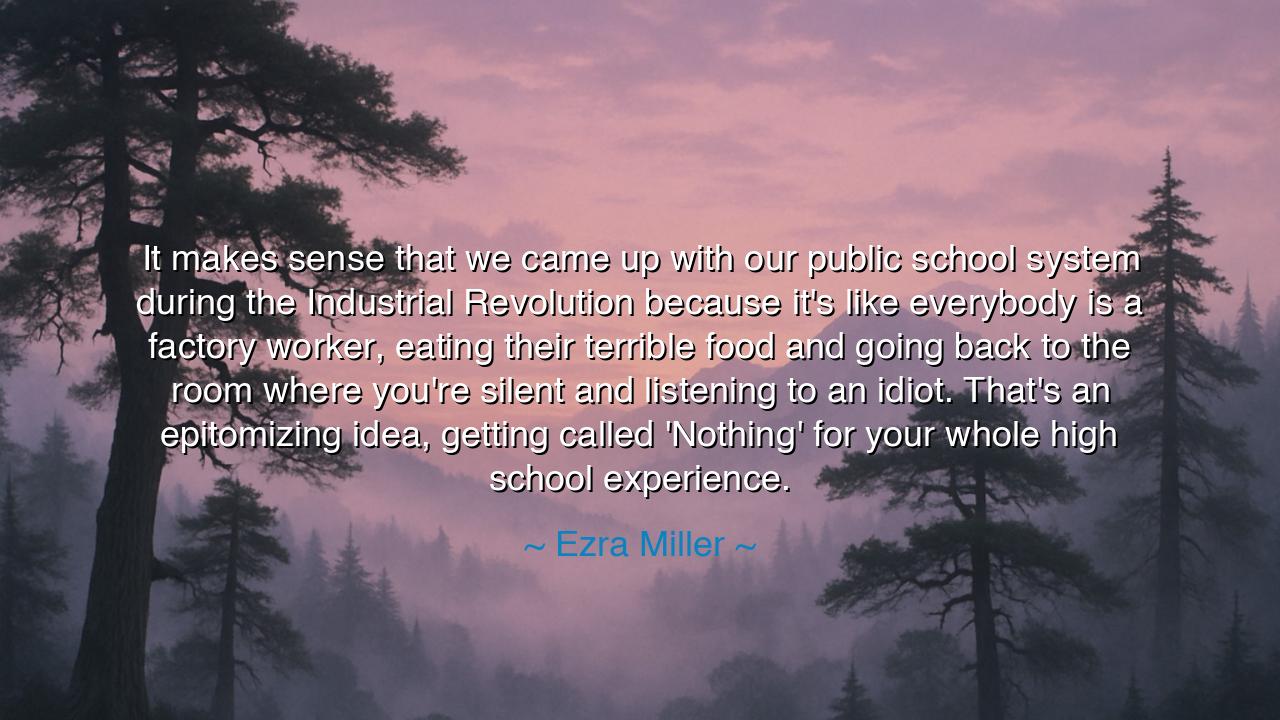
It makes sense that we came up with our public school system
It makes sense that we came up with our public school system during the Industrial Revolution because it's like everybody is a factory worker, eating their terrible food and going back to the room where you're silent and listening to an idiot. That's an epitomizing idea, getting called 'Nothing' for your whole high school experience.






Host: The room was quiet, the soft hum of the outside world barely making its way through the window. Jack sat near the window, his eyes fixed on the view, clearly lost in thought. Jeeny, across from him, was curled up in her chair with a cup of tea, but her attention seemed to be elsewhere. The stillness between them felt like an opportunity to reflect on deeper ideas about education, systemic structures, and how institutions shape our lives.
Host: Ezra Miller’s words filled the space: “It makes sense that we came up with our public school system during the Industrial Revolution because it’s like everybody is a factory worker, eating their terrible food and going back to the room where you're silent and listening to an idiot. That’s an epitomizing idea, getting called 'Nothing' for your whole high school experience.” The critique and disillusionment in the statement about the education system seemed to touch on a broader commentary about how schools have historically shaped the way we learn and how we are treated. Jack, who often considered the systems in place and their impacts, was the first to speak.
Jack: His voice was thoughtful, almost with a touch of frustration: “I get where Miller is coming from. The education system, especially in the way it was developed during the Industrial Revolution, seems built to produce people who fit a mold—like factory workers. It’s not about nurturing individuality or creativity; it’s about compliance and following a set structure. School becomes this place where you’re expected to be silent, to just absorb information, and there’s very little room for critical thinking or personal growth. It’s as if the system treats students as interchangeable parts, like cogs in a machine.”
Jeeny: She nodded, her voice gentle, but filled with understanding: “Exactly. Miller’s critique cuts to the heart of how we often approach education today. It’s about standardization, about creating an environment where everyone follows the same path, listens to the same teacher, and absorbs the same information. But it’s not a system that values individuality or recognizes that not everyone learns the same way. It’s about conformity, not about nurturing diverse talents or interests. And as a result, many students feel like they’re just going through the motions, losing a sense of purpose or identity.”
Host: The room seemed to grow a little heavier, as if Miller’s words had unlocked something deeper about how institutions, like schools, are often designed to shape us into a specific version of what society expects. Jack, who typically focused on more pragmatic views, seemed to reflect on the emotional toll this system can take on students, especially when they are treated as faceless parts of a system, rather than as individuals.
Jack: His voice softened, almost reflective, as he continued: “Maybe that’s the problem with the system. It’s not just about learning—it’s about being shaped into something the system wants you to be, not about fostering the natural curiosity or creativity we all have. You’re told you’re ‘nothing’ if you don’t fit into the mold, which is where the system fails. It takes away the sense of individuality and leaves people feeling like they don’t matter, like they’re just cogs in a machine.”
Jeeny: Her smile was gentle, her voice reassuring: “Exactly. And that’s the real damage. If we’re constantly told we’re nothing, that we don’t fit the traditional mold, we internalize that. We stop believing in ourselves, in our own potential. Miller’s words hit home because so many people leave high school feeling like they never lived up to expectations or never found their voice. The system doesn’t empower them—it suppresses them.”
Host: The room seemed to grow a little still, as if the conversation had unearthed something significant about the nature of education and how institutions can shape not just our learning, but our sense of self. The idea that schools, while meant to prepare us for the world, can sometimes make us feel insignificant or unimportant, seemed like a powerful reflection on how systems often fail to nurture students in meaningful ways. Jack and Jeeny sat in the understanding that the traditional education model doesn’t always work for everyone, and it often leaves people feeling lost or unseen.
Jack: His voice, now softer, almost resigned, reflected this deeper understanding: “Maybe that’s the real challenge. Schools often focus on making people fit into a specific mold, rather than helping them find their unique strengths or passions. What would the system look like if it celebrated individuality, if it encouraged students to explore what makes them different rather than telling them they’re ‘nothing’ if they don’t conform?”
Jeeny: She nodded, her smile affirmative, filled with understanding: “Exactly. Education should be about empowerment, about helping people discover who they are and what they can offer the world, rather than forcing them into a predefined box. When we stop seeing students as individuals, when we stop nurturing their creativity and passions, we do a disservice to their growth and their potential.”
Host: The evening continued, but the world outside felt distant now. Inside, Jack and Jeeny sat in the quiet realization that the way we approach education can have a profound effect on how individuals see themselves and their worth. The traditional system, which often values conformity over individuality, can leave many feeling lost, disempowered, or as if they are “nothing.” However, true education should be about empowerment, growth, and the ability to discover one’s own path.






AAdministratorAdministrator
Welcome, honored guests. Please leave a comment, we will respond soon